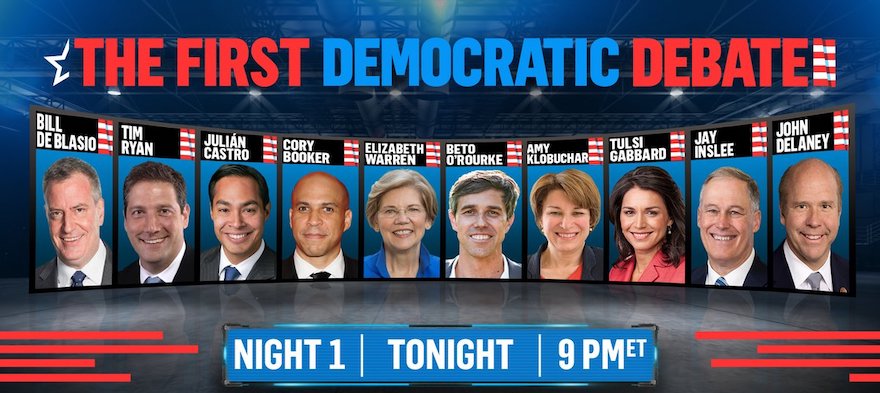
Jun 26, 2019 12:00:00 AM
The lights are ready to beam bright, the NBC News graphics team is probably demanding raises after working on introductions for 20 candidates and Miami-area dry cleaners are likely working overtime so every would-be political superstar’s collar looks pristine. That’s right, the first Democratic presidential primary debate is upon us—well, night one of two is, anyway.
But even with two full nights of wall-to-wall coverage scheduled, will there be much discussion of education?
Here are three things I’ll be listening for during the debate(s).
There truly is a science of reading—and we are doing a subpar job of teaching it to American kids. As Emily Hanford has documented, U.S. kids are not reading at grade level, with only 37% of the nation’s fourth graders and 36% of the country’s eighth graders scoring as proficient readers in 2017.
Per Hanford’s research, the solution would come in teacher training. Currently, [pullquote position="right"]teachers aren’t being given access—or are actively refusing such access—to the research on phonics[/pullquote] in favor of failed philosophies like “whole language” reading, a style that downplays the building blocks of learning the written word that has come into vogue over the last few decades in teaching colleges.
Candidates may not necessarily be able to change the way teaching colleges go about their business, even if they make it all the way to the White House. But if any candidates were to mention this enormous but fixable reading deficit over the next couple nights, I’d be ecstatic because the debate stage is the perfect place to keep this issue top of mind for citizens and school policymakers.
Title I of the Elementary and Secondary Education Act of 1965 is literally called “Financial Assistance To Local Educational Agencies For The Education Of Children Of Low-Income Families.” And yet, as U.S. News & World Report has noted, that’s not how all of the program’s 14.5 billion dollars are distributed in reality.
In fact, 20 percent of all Title I money for poor students – $2.6 billion – ends up in school districts with a higher proportion of wealthy families.
Twenty is a big percent. Especially when none of that 20% is intended to go where it’s wound up. These candidates have a chance to diagnose this problem live on television with potentially tens of millions of Americans tuning in. They can explain that a policy change in this area would mean billions more dollars to inject into struggling schools for kids who deserve a full, undiminished opportunity to succeed. It wouldn’t require new taxes, new regulations, nothing of that sort. It would merely be changing how the existing money is spent. I really hope someone pipes up on this.
The Democratic primary has been a depressing race if you care about education, with candidates like former Vice President Joe Biden seemingly misunderstanding the differences between charter schools and magnet schools and others, like Sen. Bernie Sanders, refusing to work with entire categories of education, like charters, which currently teach approximately 3.2 million students across the country—that’s more people than the population of Chicago. It’s felt like a bunch of people getting vein-popping-out mad about vocabulary instead of answering the question, “How do we teach children better?”
There have been some ideas from the crowd that seem big on paper, but are still missing something. Sen. Kamala Harris wants to raise teachers’ salaries about $13,500 per person (which would be life changing money for teachers pretty much everywhere, and we should not diminish that), but her plan doesn’t address how to optimize teachers’ talents in the classroom. Former Housing and Urban Development Secretary Julián Castro’s People First Education plan, which includes a bevy of new federal investments in education, teacher raises, universal pre-K and more, is a thoughtful and pragmatic and appealingly (for this writer) center-left version of dealing with the education system we already have, but [pullquote position="left"]it’s more good-government tweak than evolutionary leap forward.[/pullquote] Sen. Elizabeth Warren’s early child care proposal, in which the federal government would run a network of care centers so young parents can get back to work without spending tens of thousands on private care options, would be a transformational social policy. However, despite the seeming potential these centers would have to improve early childhood education, the coverage and Warren herself have been a little quiet about how this policy would affect education. It would be great to see that spelled out onstage.
So what’s next? What’s the big thing? Not the helpful-but-expensive thing or the well-managed thing or the thing with potential to grow into something more. I’ve seen, and am encouraged by, some candidates’ plans for higher education loan forgiveness, which is a big deal. But I’m looking for something similar in scope to the New Deal, the Great Society, the Green New Deal, but for K-12 kids.
Rob Samuelson is a Staff Writer at Education Post and Digital Media Manager for the brightbeam network.
The story you tell yourself about your own math ability tends to become true. This isn’t some Oprah aphorism about attracting what you want from the universe. Well, I guess it kind of is, but...
If you have a child with disabilities, you’re not alone: According to the latest data, over 7 million American schoolchildren — 14% of all students ages 3-21 — are classified as eligible for special...
The fight for educational equity has never been just about schools. The real North Star for this work is providing opportunities for each child to thrive into adulthood. This means that our advocacy...
Your donations support the voices who challenge decision makers to provide the learning opportunities all children need to thrive.
Ed Post is the flagship website platform of brightbeam, a 501(c3) network of education activists and influencers demanding a better education and a brighter future for every child.
© 2020–2024 brightbeam. All rights reserved.
Leave a Comment